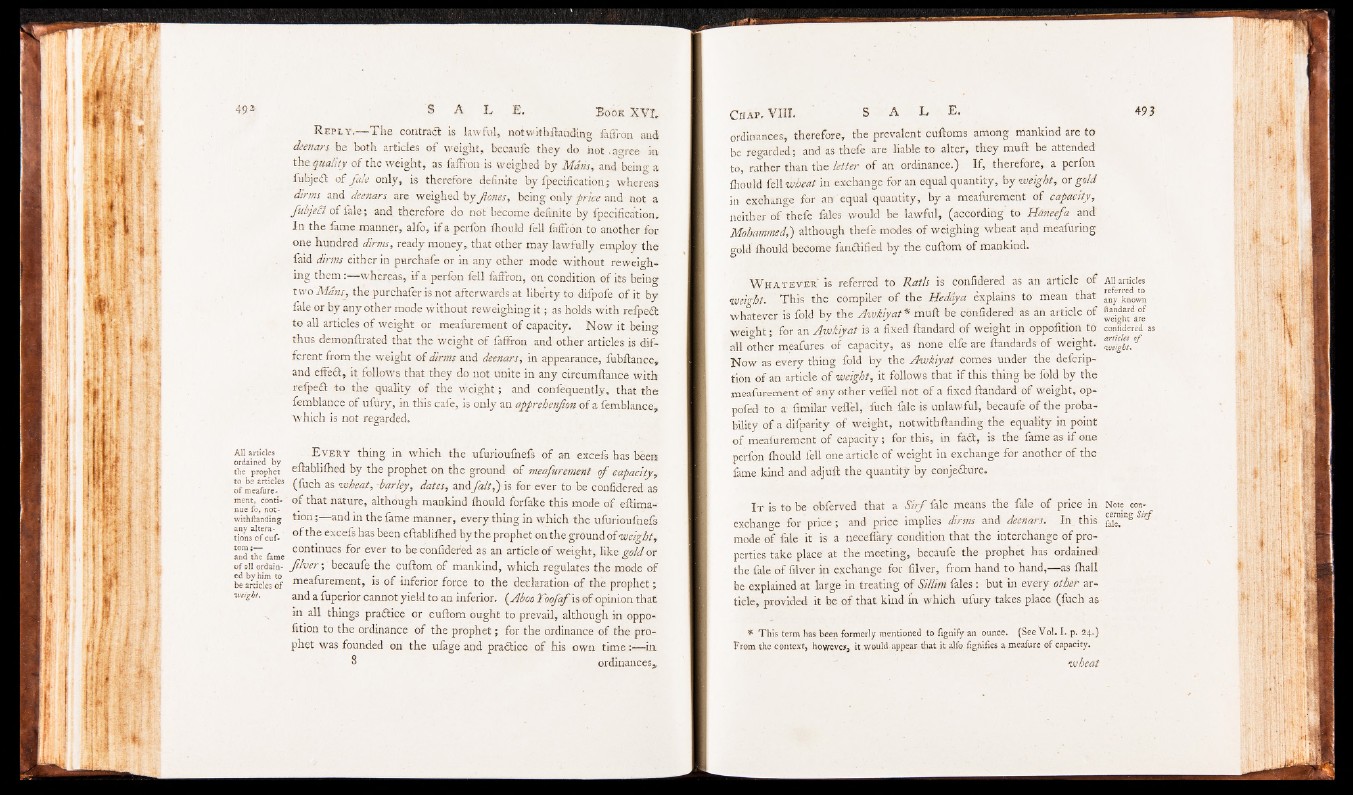
All articles
ordained by
the prophet
to be articles
of meafure-
ment, conti- '
nue fo, not-
withftanding
any alterations
of cuf-
tom ;—
and the fame
of all ordained
by him to
be articles of
'weight.
R e p l y .— The contrail is lawful, notwithftanding faffroa and
deenars be both articles of weight, becaufe they do hot .ao-ree in
the quality of the weight, as faffron is weighed by Mans, and being a
fubjedt of fale only, is therefore definite by fpecificatioii; whereas
dirms and deenars are weighed by fanes, being only price and not a
fubjeSl of fale; and therefore do not' become definite by fpecifieation.
In the fame manner, alfo, if a perfon fhould fell faffron to another for
one hundred dirms, ready money, that other may lawfully employ the
faid dirms either in purchafe or in any other mode without reweighing
them:— whereas, if a perfon fell faffron, on condition of its beino-
two Mans, the purchafer is.not afterwards at liberty to difpofe of it by
fale or by any other mode without reweighing i t ; as holds with refpedl
to all articles of weight or meafurement of capacity. Now it being
thus demonftrated that the weight of faffron and other articles is different
from the weight of dirms and deenars; in appearance, fubftance,
and effect, it follows that they do not unite in any cireumftance with
refpedl to the quality of the weight; and confequently, that the
femblance of ufury, in this cafe, is only an apprehenfon of a femblance,
which is not regarded.
E very thing in which the ufurioufnefs of an excefs has been
eflablifhed by the prophet on the' ground of meafurement o f capacity,
(fuch as wheat, -barley, dates, andy«/r,}is for ever to be confidered as
of that nature, althdugh mankind fhould fiorfake this mode of eftima-
tion;— and in the fame manner, every thing in which the ufurioufnefs
of the excefs has been eflablifhed by the prophet on the ground of weight,
continues for ever to be confidered as an article of weight, like mid or
ftlver-, becaufe the cuflom of mankind, which regulates the mode of
meafurement, is of inferior force to the declaration of the prophet;
and a fuperior cannot yield to an inferior. (.Aboo IToofcf 'vs of opinion that
in all things practice or cuflom ought to prevail, although in oppo-
fition to the ordinance of the prophet; for the ordinance of the prophet
was founded on the ufage and practice of his o wn time:— in
8 ordinances*
ordinances, therefore, the prevalent cuftoms among mankind are to
be regarded ; and as thefe are liable to alter, they muft be attended
to, rather than the letter of an ordinance.) If, therefore, a perfon
fhould fell wheat in exchange for an equal quantity, by weight, or gold
in exchange for anr equal quantity, by a meafurement of capacity,
neither of thefe fales would be lawful, (according to Haneefa and
Mohammed,) although thefe modes of weighing wheat and meafuring
g-old fhould become fandlified by O the cuflom of mankind.
W h a t e v e r is referred to Ratls is confidered as an article of
weight. This the compiler of the Heddya explains to mean that
whatever is fold by the Awkiyat * muft be confidered' as an article of
weight; for an Awkiyat is a fixed ftandard of Weight in oppofition tó
all other meafures of capacity, as hone élfe are ftandards of weight.
Now as every thing fold by the Awkiyat comes under the delcrip-
tion of an article of weight, it follows that if this thing be fold by the
meafurement of any other vefi'el not of a fixed ftandard of weight, op-
pofed to a- fimilar veflel, fuch fale is unlawful, becaufe of the probability
of a disparity of weight, notwithftanding the equality in point
of meafurement of capacity; for this, in facl, is the lame as if one
perfon fhould fell one article of weight in exchange for another of the
■ fame kind; and adjuft the quantity by conjecture.
I t is to be obferved that a S irf fale means the fale of price in
exchange for price; and price implies dirms and deenars• 1 u this
mode of fale it is- a neeeflary condition that the interchange of properties
take place at the meeting, becaufe the prophet has ordained:
the fale of filver in exchange for ftlver, from hand to hand,— as fhall
be explained at large in treating of Sillitn fales: but in every other article,
provided it be of that kind in which ufury takes place (fuch as
* T h is term has been formerly mentioned to fignifyan ounce. (See V o l. I ..p . 24.)
From the context, however, it would appear that it alfo iighifies a meafurc o f capacity.
wheat
All articles
referred to
any known ■
flandard of
weight are
confidered as
articles of
weight*
Note concerning
Sirf
fale.